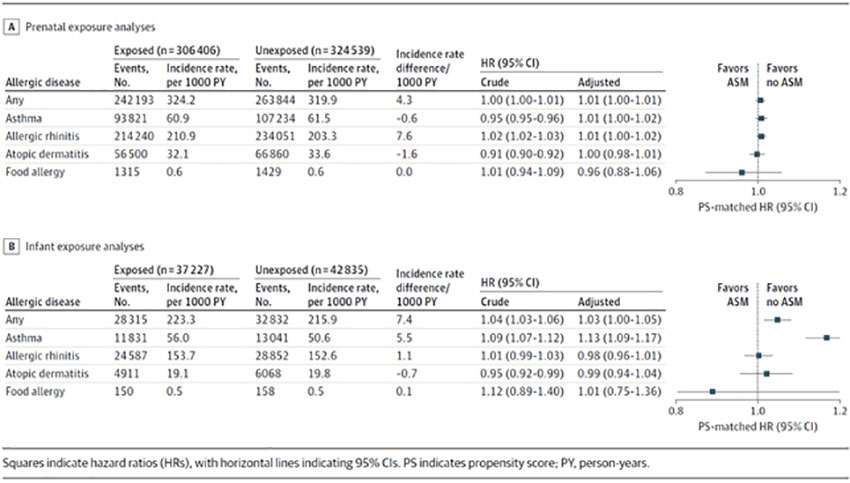Prof. Ju-Young Shin (School of Pharmacy) Investigates the Relationship between
the Use of Gastric Acid Secretion Inhibitors and the Occurrence of Allergic Diseases in Children
- Increased risk of asthma for newborns regarding gastric acid secretion inhibitors

[Photo] (from the left) Prof. Ju-Young Shin, Dr. Yunha Noh, Dr. Han Eol Jeong, Ahhyung Choi, Eun Young Choi
Prof. Ju Young Shin's research team (School of Pharmacy) (first co-author Dr. Yunha Noh, Dr. Han Eol Jeong, co-author Researcher Ahhyung Choi, Eun Young Choi), as a result of conducting a safety study on the use of gastric acid secretion inhibitors in mothers and newborns using domestic health care big data, found that the use of gastric acid secretion inhibitors during pregnancy did not increase the risk of allergic diseases in children but was revealed to increase the risk of asthma for newborns within one year of age.
The number of children and adolescents with allergic diseases is increasing worldwide. Allergic diseases are caused by a combination of genetic predisposition and environmental factors. As recent studies have hypothesized that the use of gastric acid secretion inhibitors during pregnancy or in newborns could lead to the occurrence of allergic diseases in children, it was necessary to investigate the relevance through epidemiological studies.
Gastric acid secretion inhibitors are very effective in treating gastrointestinal diseases such as gastroesophageal reflux disease and gastritis. The typical examples are proton pump inhibitor (PPI) and histamine 2 receptor antagonist (H2RA). However, gastric acid secretion inhibitors can affect immunity by changing the intestinal microbial ecosystem, and lack of gastric acid can also cause allergies and inflammation as protein in food is absorbed without proper decomposition.
Thus, Prof. Shin’s research team collaborated with Karolinska Research Center, Oslo University, University of Southern Denmark, University College London, and Prof. Dong Keon Yon (Kyung Hee University School of Medicine), and used National Health Insurance Corporation Health Insurance Claims Data to investigate the relationship between the use of gastric acid secretion inhibitors (PPI, H2RA) during pregnancy or to newborns and the occurrence of major allergic diseases in children (asphyxia, allergic rhinitis, atopic dermatitis, food allergies).

[Image] Evaluation result of relationship between the use of gastric acid secretion inhibitors and the risk of developing allergic diseases in children
Based on mother-newborn baby-linked data with birth records for about 12 years from 2008 to 2019, a sibling matching cohort consisting only of siblings was established to consider genetic and environmental factors. As a result of comparing the group taking gastric acid secretion inhibitors (306,406) and the group not taking gastric acid secretion inhibitors (324,539) during pregnancy within the cohort, it was found that the use of gastric acid secretion inhibitors during pregnancy did not increase the risk of developing allergic diseases in children. On the other hand, as a result of comparing the gastric acid secretion inhibitor group (37,227) and the non-dose group (42,835) in newborns within 1 year of age, the risk of asthma in the taking group was 1.13 times higher than that of the non-dose group.
Prof. Shin said, “As a result of confirming the relationship based on domestic data, the use of gastric acid secretion inhibitors (PPI, H2RA) during pregnancy does not increase the risk of developing allergic diseases in children, so the use of the drug during pregnancy is relatively safe. However, the use of gastric acid secretion inhibitors in newborn babies has been confirmed to slightly increase the risk of asthma in children.”
The research staff added that this study has significance in overcoming genetic and environmental factors that were not considered in previous studies in research design. More care should be taken when prescribing gastric acid secretion inhibitors to infants, and excessive use of the drug should be avoided unless it is required for treating a disease. However, for any medication, it is important to use it after weighing gains and losses.”
This research result has been posted online in a prominent international journal in the field of pediatric and adolescent science, JAMA Pediatrics (IF: 26.800, JCR ranking Top 1.2%) on January 9th.
※ Paper Title: Prenatal and Infant Exposure to Acid-Suppressive Medications and Risk of Allergic Diseases in Children
※ Paper Link: https://jamanetwork.com/journals/jamapediatrics/fullarticle/2800319
